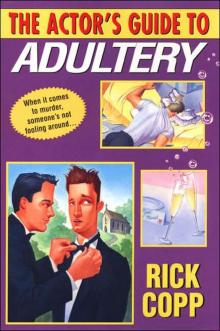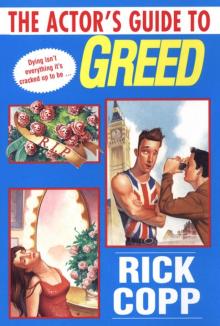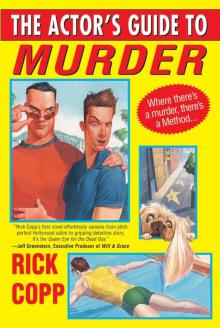The Actor's Guide To Murder Read online
Outstanding praise for Rick Copp and The Actor’s Guide to Murder
“Hollywood characters, self-deprecating humor, and more than a few pokes at America’s TV mentality make this a light-hearted first novel.”
—Library Journal
“In order to write a successful mystery novel, you need at least three key elements: an engaging and interesting sleuth to navigate the pitfalls of the plot; a plausible, well-thought-out mystery that keeps the reader guessing; and a rogues’ gallery of suspects, each with a motive to do harm and without an alibi. In The Actor’s Guide to Murder, we have all three in a bright, action-packed mystery that turns Hollywood on its ear and keeps the reader wanting more. The Actor’s Guide to Murder is an immensely satisfying read, one that would be great for a lazy afternoon and a perfect choice when a good mystery is warranted.”
—The Lambda Book Report
“The story has considerable zest and enough sprite humor to keep readers glued and giggling in this solid series kick-off.”
—Bay Area Reporter
“Rick Copp’s new book breathes a killer sense of humor into the murder mystery genre. A hilariously entertaining page-turner.”
—Out.com
“A funny novel.”
—Maine Sunday Telegram
“Only the pop-culture blender that is Rick Copp’s mind could conceive a murder mystery featuring a gay former child star turned detective. Jarrod Jarvis, the star of the ’80s hit Go to Your Room doggedly pursues the truth after he discovers the body of another former (lover and) kid actor floating in a swimming pool à la William Holden. In a tale with more twists and turns than Beachwood Canyon, Jarrod discovers that guest starring on Simon and Simon doesn’t necessarily prepare you for dealing with a real life killer. Reminiscent of Ross McDonald crossed with an episode of E! True Hollywood Story, The Actor’s Guide to Murder is genuinely funny, and a genuine thriller.”
—Brian Levant, director of Beethoven, The Flintstones and Snow Dogs
Please turn the page for more outstanding praise for
The Actor’s Guide to Murder!
“Gives the genre a robust and long overdue sense of humor.”
—Next Magazine
“I am an instant fan of Rick Copp’s writing! An inventive and witty whodunit, The Actor’s Guide to Murder is a completely entertaining page-turner featuring an unlikely crime solving hero: washed-up television star Jarrod Jarvis. With his own life in jeopardy, Jarrod has no choice but to try to stop a mysterious killer. The fun begins when the corpses start piling up like cadavers at a Six Feet Under casting call. No doubt Jessica Fletcher and Hercule Poirot would have killed to be the sleuths on this rollicking case.”
—Ben Tyler, author of One Night Stand
“Light-hearted . . . a perfect subway read.”
—H/X Magazine
“The Actor’s Guide to Murder slayed me with its lethal combination of belly laughs, clever plotting and genuinely unpredictable denouement. Don’t even try to guess whodunit . . . just sit back and enjoy who’s doing it.”
—Bennett Yellin, screenwriter (Dumb and Dumber and Stuck On You)
“Rick Copp flawlessly meshes the twists and turns of a top-notch thriller with the name-dropping tidbits of a Hollywood memoir.”
—Verge Magazine
“The Actor’s Guide to Murder is just as much fun as your favorite sitcom. I wish I could visit with Jarrod and friends every week.”
Laurien Berenson, author of Best in Show
“A lively tale, wittily told.”
—Lavendermagazine.com
THE ACTOR’S GUIDE TO MURDER
Rick Copp
KENSINGTON BOOKS
http://www.kensingtonbooks.com
All copyrighted material within is Attributor Protected.
Table of Contents
Outstanding praise for Rick Copp and The Actor’s Guide to Murder
Title Page
Dedication
Acknowledgments
Chapter One
Chapter Two
Chapter Three
Chapter Four
Chapter Five
Chapter Six
Chapter Seven
Chapter Eight
Chapter Nine
Chapter Ten
Chapter Eleven
Chapter Twelve
Chapter Thirteen
Chapter Fourteen
Chapter Fifteen
Chapter Sixteen
Chapter Seventeen
Chapter Eighteen
Chapter Nineteen
Chapter Twenty
Chapter Twenty-One
Chapter Twenty-Two
Chapter Twenty-Three
Chapter Twenty-Four
Chapter Twenty-Five
Chapter Twenty-Six
Chapter Twenty-Seven
Chapter Twenty-Eight
Chapter Twenty-Nine
Chapter Thirty
Chapter Thirty-One
Chapter Thirty-Two
Chapter Thirty-Three
Chapter Thirty-Four
Chapter Thirty-Five
THE ACTOR’S GUIDE TO ADULTERY
Copyright Page
To Mom and Fred
For your love, support, and for never insisting I have something to fall back on.
Acknowledgments
First and foremost, I would like to thank John Scognamiglio, who in addition to being a first rate editor, is also, I’m proud to say, a new friend.
I’d like to give special thanks to Joel Fields for being the first brave soul to read a very rough manuscript.
Thanks to all of the enthusiastic friends and family who read the many incarnations of this book and offered invaluable advice: Bennett Yellin, Marilyn Webber, Liz Friedman, Yvette Abatte, Lori Alley, Woody and Tuesdi Woodworth, Joe Dietl, David A. Goodman, Patricia Hyland, Craig Thornton, Sharon Killoran, Brian Levant, and my trusty Writers’ Group, which includes Dana Baratta, Melissa Rosenberg, Dan Greenberger, Rob Wright, Allison Gibson, and especially Greg Stancl.
Thanks to Linda Steiner, Laurice and Chris Molinari, Mark Greenhalgh, Laura Simandl, Robert Waldron, Michael Irpino, Ben Zook, Mike Byrne, and Vincent Barra for their enduring love and support, and to Rob Simmons for being a constant source of inspiration.
Also, to my rocks at the William Morris Agency, Lanny Noveck, Cori Wellins, and Jim Engelhardt, my heartfelt gratitude.
And finally, thank you, Holly, Jessica, Megan, and Justin Simason for enriching my life every day.
Chapter One
I never would have gone to that Smallville audition if I had known my psychic would foresee the murder of someone I knew. On the other hand, homicides occur in Los Angeles every day, a network audition maybe once or twice a month. If you’re lucky.
But there I was, sides in hand, running the lines over and over in my head. The casting director brought me in for the role of a teacher. A teacher. Hell, the kid who plays high school heartthrob/ superhero Clark Kent looks thirty-five, so where does that put me? Unbelievable. They always used to cast me as a student. But now that lovable boyish exuberance that had won me so many youthful parts in television shows and commercials was disappearing faster than my once rock hard abs.
“Jarrod Jarvis?”
“Right here.”
I took out my 8x10 glossy from the snappy leather briefcase my mother gave me last Christmas (her hint that it was time for me to get a real job), and handed it over to the casting director. She glanced at it, and then lit up as if reunited with a long lost relative.
“I’m Ellen. I loved you when I was a kid! I had your poster on my wall and everything!”
A major reason for the recent resurgence in my acting career is due
to one indisputable fact. Most of the kids who watched me on television in the eighties are now in positions of power. It’s a nostalgia thing, and there’s no reason for me not to capitalize on it. I decided to make her day.
“Baby, don’t even go there!”
It was the trademark line from my five years playing a bright, wisecracking, girl-obsessed troublemaker on the hit sitcom Go to Your Room! The writers trotted it out whenever my TV parents tried to blame me for some domestic crisis. It was printed on T-shirts and even mentioned in some book called TV’s Most Quotable Lines. Okay, so it’s not Pinter or even Neil Simon, but the show was what it was, which is probably the reason I never tearfully clutched an Emmy on national TV like Kristy McNichol.
Ellen exploded with laughter upon hearing my famous catchphrase. She could barely contain herself as she ushered me into the conference room.
Inside it was a different atmosphere altogether—three stone-faced producers and a fidgeting casting assistant tapping his foot behind a video camera. The walls of the room were peeling, the couch dusty and stained. As for the oppressive overhead lighting, well, let’s just say every pore and pockmark on my face was ready for its close up, Mr. DeMille. Not an auspicious beginning.
Someone was eating Dorito chips from a big plastic fluorescent green bowl. They all stared at me blankly.
Ellen, who was so effusive and supportive up to that point, instantly changed masks. She was now playing the utmost serious professional, sliding my picture in front of the highest ranking producer in the middle, then retreating to the back of the room.
I was completely alone now.
The assistant started taping.
All I could hear was the whirring of the camera, and those damn Dorito chips. Crunch, crunch, crunch.
Ellen poked her head up from the back. “Anytime you’re ready, Jarrod.”
I had only gotten the sides by fax this morning, so I didn’t have much time to prepare (a standard actor excuse that I’ve used shamelessly time and time again).
I wanted to throttle the guy eating the chips because it was throwing my concentration. How could I envision myself in a college lecture hall with Clark and his magazine cover friendly cohorts if all I could focus on was some idiot’s annoying chewing?
I decided to use my anger and channel it for the scene. “Don’t try to tell me I was seeing things, Kent. I know what I saw, and you were in the school parking lot lifting the rear bumper of that Saturn with your index finger.”
I heard some mumbling from the back of the room. I presumed it was Ellen feeding me my cue line. Luckily, I already knew what came next.
“And yesterday, I swore I saw you run past my house at forty-five miles per hour. You’re hiding something, you little scumbag, and I’m making it my personal mission to find out what it is!”
I was on a roll. I was making a meal of these lackluster lines. In my heart, I knew I had it in the bag.
“Thank you,” said one of the producers as he picked up the next headshot.
I was only a third of the way through the scene. What was going on? I craned my neck to try and get some kind of explanation from my one ally Ellen, but she was already out the door to round up the next victim.
I picked up my briefcase and started out.
I couldn’t help myself. I had to know. I turned back to the three Buddhas behind the table.
“Was it my reading?”
The big cheese in the middle looked at me. At first I thought he was going to verbally assault me. How dare a lowly actor speak to a producer unsolicited? But instead he cracked a smile and said, “Oh no. You’re just too young.”
I guess the day wasn’t a total loss.
On my way out, I ran into Willard Ray Hornsby. Willard was auditioning for the same part. We were about the same age, but since Willard had prematurely graying hair, I thought he might have a pretty good shot at the role.
Willard and I had done a production of Agatha Christie’s Ten Little Indians in Northridge (the epicenter of the big ’94 earthquake) a few years back. The theatre was crumbling even before the trembler, but it was a nice space and we got several polite reviews in some of the better Valley weeklies.
“It’s my birthday,” Willard said as we hugged outside the casting office.
“Happy birthday!” I was embarrassed that I hadn’t remembered. “What are you doing to celebrate?”
“Getting this part.”
Willard was certainly more confident and focused than I had seen him in a long time. He too was a member of the Former Child Actor Club like myself, and the past decade had been one big dry spell for him.
“Wait for me, okay? I want to catch up!” he said as he squeezed my arm and boldly strode inside the lion’s den.
Willard was born in Abilene, Texas. He would have stayed there if it weren’t for his ambitious mother, Tamara Hornsby. In the early eighties, a movie company came to Abilene to shoot one of those cheesy psycho-motorist-stalks-nubile-young-hitchhiker TV movies called Death Car in Texas starring Charlene Tilton who, at the time, was riding the crest of her Dallas fame. Tamara yanked Willard out of school one day and dragged him to an open call for extras. Both mother and son were cast as patrons in a roadside diner where Charlene first appears, who played a perky coed on the way to her sophomore year at Texas A & M.
Tamara wasn’t a shy local by any means. Before the second day of shooting was over, she was sleeping with the line producer and even managed to snare herself a small speaking role. By the time production wrapped, she was packing her bags and hauling her son out west to the land of fruits and nuts to live out her dream as a famous actress. Her emphasis was on famous, not actress.
She rented a small no-frills one-bedroom apartment on Cole Avenue and later enrolled Willard in Hollywood High, where we met. We were freshman lab partners when I wasn’t off taping my series. Willard had acting aspirations as well, and if he was resentful of my success, he didn’t show it.
He wasn’t what you’d call leading man material. He was rather tall and gawky, his nose was long and bent, and his black hair was rather matted and oily, but he had these stunning green eyes that struck you dumb. Casting directors were quite taken with them and found him a lot of work as a geeky kid scientist or murderous mama’s boy.
He never got a regular series role, and I could see that it bothered him.
We lost touch after high school, but a couple of years ago we ran into each other at a mutual friend’s birthday party at Barney’s Beanery, a hip and cheap Hollywood establishment where struggling actors with no money went to load up on carbs and liquor. Since then, we reconnected and became good friends if not best buds.
Willard claimed that he was destined to be unsuccessful in this lifetime because he had been a god in many other lifetimes. He had to learn humility. Whatever works, I say.
He was a big believer in past lives. In fact, he was convinced that we were sisters in seventeenth century Russia, where I was consumed with jealousy over his beauty, and smothered him with a pillow one night. He brought that up every time we had a fight. My boyfriend Charlie once said that since Willard could find no reason to be mad at me in this lifetime, he had to go back a few to justify his sometimes pissy behavior.
Willard bounded out of the conference room where I had bombed just five minutes earlier.
I was busy trying to figure out how I could make up for not remembering his birthday.
“I got it! I got the part!” Willard was ecstatic.
I was in shock. Not that he was cast and I wasn’t, but that he was so confident going in that he would get it, and then he did. What was his secret? Was he reading a Deepak Chopra book I didn’t know about?
Willard impulsively grabbed me by the arms and kissed me full on the mouth. It was the most obvious way for him to show me how excited he was. And it gave the other actors in the room an eyeful.
It was clear to me that Willard hadn’t worked in a while, and this victory meant a lot to him. The fact that it was
his birthday was icing on the cake (pardon the pun).
“I have a wardrobe fitting tomorrow and I start shooting on Monday,” he said.
“Let me throw you a party tomorrow night. It’ll be a combination birthday/congratulations party. I’ll invite Laurette, a few people from class . . .”
Usually Willard was rather reclusive. In fact, I half expected him to decline my offer, but I got him on a good day. He was more than amenable to a celebration. We settled on eight o’clock at my house with an Italian theme (his favorite food and type of man).
Now all I had to do was break the news to Charlie. Fridays were always his night to order in Indian food and watch a DVD. I hated to break it to him that instead this week we would be blowing up helium balloons and moving all our living room furniture in the corner so we could have a makeshift dance floor.
But he would cave. He always did. He’d let me have a party because a party was what I needed right now. Socializing always improves an unemployed actor’s spirits. Especially since most of the crowd who show up are actors who aren’t working either. There’s always safety in numbers.
Chapter Two
By the time I met my manager Laurette at Koo Koo Roo, she was arguing with a hulking Russian woman who could have been a linebacker for the Dallas Cowboys. There was a heated dispute over who had claimed the last available booth first. Despite the woman’s formidable size, I knew she didn’t stand a chance. Laurette was an extremely focused and tenacious woman, who was famous (at least in our circles) for getting what she wanted, whether it was a plum role for one of her clients, a boyfriend, money for her favorite charity, or a booth at a fast-food chicken restaurant.

 The Actor's Guide To Adultery
The Actor's Guide To Adultery The Actor's Guide To Greed
The Actor's Guide To Greed The Actor's Guide To Murder
The Actor's Guide To Murder